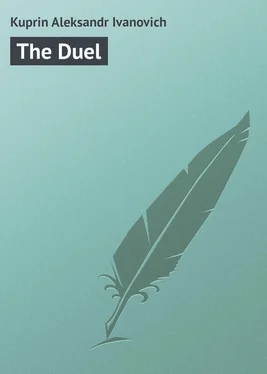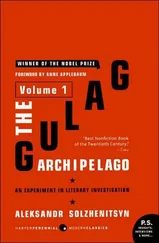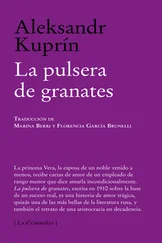Aleksandr Kuprin - The Duel
Здесь есть возможность читать онлайн «Aleksandr Kuprin - The Duel» — ознакомительный отрывок электронной книги совершенно бесплатно, а после прочтения отрывка купить полную версию. В некоторых случаях можно слушать аудио, скачать через торрент в формате fb2 и присутствует краткое содержание. Жанр: Русская классическая проза, на английском языке. Описание произведения, (предисловие) а так же отзывы посетителей доступны на портале библиотеки ЛибКат.
- Название:The Duel
- Автор:
- Жанр:
- Год:неизвестен
- ISBN:нет данных
- Рейтинг книги:5 / 5. Голосов: 1
-
Избранное:Добавить в избранное
- Отзывы:
-
Ваша оценка:
- 100
- 1
- 2
- 3
- 4
- 5
The Duel: краткое содержание, описание и аннотация
Предлагаем к чтению аннотацию, описание, краткое содержание или предисловие (зависит от того, что написал сам автор книги «The Duel»). Если вы не нашли необходимую информацию о книге — напишите в комментариях, мы постараемся отыскать её.
The Duel — читать онлайн ознакомительный отрывок
Ниже представлен текст книги, разбитый по страницам. Система сохранения места последней прочитанной страницы, позволяет с удобством читать онлайн бесплатно книгу «The Duel», без необходимости каждый раз заново искать на чём Вы остановились. Поставьте закладку, и сможете в любой момент перейти на страницу, на которой закончили чтение.
Интервал:
Закладка:
The shades of a balmy April night fell. He heard his servant quietly occupied with some metal object in the hall.
“Curiously enough,” said he to himself, “I have read somewhere or other that one cannot live a single second without thinking. But here I lie and think about absolutely nothing. Isn’t that so? Perhaps it is just this: I am thinking that I am thinking about nothing . It even seems as if a tiny wheel in my brain is in motion. And see here a new reflection, an objective introspection – I am also thinking of – ”
He lay so long and tortured himself with such forced mental images that returned in an eternal circle that it finally became physically repulsive to him. It was just as if a great loathsome spider, from which he could not extricate himself, was softly groping about under his brain . At last he raised his head from the pillows and called out —
“Hainán.”
At that very moment was heard a tremendous crash of something falling and rolling on the floor. It was probably the funnel belonging to the samovar which had dropped. The door was opened hastily and shut again with a loud bang. The servant burst into the room, making as much noise in opening and shutting the door as if we were running away from some one.
“It is I, your Honour,” shrieked Hainán in a fear-stricken voice.
“Has there been any message from Lieutenant Nikoläiev?”
“No, your Excellency,” replied Hainán in the same shrieking tone.
Between the officer and his servant there existed a certain simple, sincere, affectionately familiar relationship. When the question only required the usual stereotyped, official answer, e.g. “Yes, your Excellency,” “No, your Excellency,” etc., then Hainán shrieked the words in the same wooden, soulless, and unnatural way as soldiers always do in the case of their officers, and which, from their first days in the recruit school, becomes ineradicably ingrained in them as long as they live.
Hainán was by birth a Circassian, and by religion an idolater. This latter circumstance gave great satisfaction to Romashov, because among the young officers of the regiment the silly and boyish custom prevailed of training their respective servants to be something unique, or of teaching them certain semi-idiotic answers and phrases.
For instance, when his friends paid him a visit, Viätkin used to say to his orderly, a Moldavian, “Busioskul, have we any champagne in the cellar?” And Busioskul would answer with imperturbable gravity, “No, your Excellency. Last night you were pleased to drink up the last dozen.” Another officer, Sub-lieutenant Epifanov, amused himself by putting to his servant learned and difficult questions which he himself could hardly answer. “Listen, my friend, what are your views on the restoration of the monarchy in France at the present day?” The servant answers, “Your Honour, it will, I think, succeed.” Lieutenant Bobetinski had written down a whole catechism for his flunkey, and the latter trained genius replied frankly and unhesitatingly to the most absurd questions, e.g. “Why is this important for the third?” Answer – “For the third this is not important.” “What is Holy Church’s opinion about it?” Answer – “Holy Church has no opinion about it.” The same servant would declaim, with the quaintest, semi-tragical gestures, Pinen’s rôle in “Boris-Gudunov.” It was also usual and much appreciated to make him express himself in French: “Bong shure, musseur. Bon nuite, moussier. Vulley vous du tay, musseur?” etc. etc., in that style. All these follies naturally arose from the dullness of that little garrison town, and the narrowness of a life from which all interests were excluded except those belonging to the service.
Romashov often talked to Hainán about his gods – about whom the Circassian had only dim and meagre ideas; but it amused him greatly to make Hainán tell the story of how he took the oath of allegiance to the Tsar and Russia – a story well worth hearing now and then. At that time the oath of allegiance was, for the Orthodox, administered by a priest of the Greek Church; for Catholics, by the ksends 3 3 Roman Catholic priests are so called in Lithuania and Poland.
; for Protestants, when a Lutheran pastor was not available, by Staff-Captain Ditz; and for Mohammedans, by Lieutenant Biek-Agamalov. For Hainán and two of his fellow-countrymen a particular and highly original form had been authorized. The three soldiers were ordered to march in turn up to the Adjutant of the regiment, and from the point of the sabre held towards them they were required to bite off, with deep reverence, a piece of bread that had been dipped in salt. Under no circumstances was the bread to be touched by their hands. The symbolism of this curious ceremony was as follows: When the Circassian had eaten his lord’s – the Tsar’s – bread and salt in this peculiar way he was ruthlessly condemned to die by the sword if he ever failed in loyalty and obedience. Hainán was evidently very proud of having thus taken his oath of allegiance to the Tsar, and he never got tired of relating the circumstance; but as every time he told his story he adorned it with fresh inventions and absurdities, it became at last a veritable Münchausen affair, which was always received with Homeric laughter by Romashov and his guests.
Hainán now thought that his master would start his usual questions about gods and Adjutants, and stood ready to begin with a cunning smile on his face, when Romashov said —
“That will do; you can go.”
“Shall I not lay out your Honour’s new uniform?” asked the ever-attentive Hainán.
Romashov was silent and pondered. First he would say “Yes,” then “No,” and again “Yes.” At last, after a long, deep sigh, uttered in the descending scale, he replied in a tone of resignation —
“No, Hainán, never mind about that – get the samovar ready and then run off to the mess for my supper.”
“I will stay away to-day,” whispered he to himself. “It doesn’t do to bore people to death by calling on them like that every day. And, besides, it is plain I am not a man people long for.”
His resolution to stay at home that evening seemed fixed enough, and yet an inner voice told him that even to-day, as on most other days during the past three months, he would go to the Nikoläievs’. Every time he bade these friends of his good-bye at midnight, he had, with shame and indignation at his own weakness and lack of character, sworn to himself on his honour that he would not pay another call there for two or three weeks. Nay, he had even made up his mind to give up altogether these uncalled-for visits. And all the while he was on his way home, whilst he was undressing, ah! even up to the moment he fell asleep, he believed it would be an easy matter for him to keep his resolution. The night went by, the morning dawned, and the day dragged on slowly and unwillingly, evening came, and once more an irresistible force drew him to this handsome and elegant abode, with its warm, well-lighted, comfortable rooms, where peace, harmony, cheerful and confidential conversation, and, above all, the delightful enchantment of feminine beauty awaited him.
Romashov sat on the edge of his bed. It was already dark, but he could, nevertheless, easily discern the various objects in his room. Oh, how he loathed day by day his mean, gloomy dwelling, with its trumpery, tasteless furniture! His lamp, with its ugly shade that resembled a night-cap, on the inconvenient, rickety writing-table, looked haughtily down on the nerve-torturing alarm-clock and the dirty, vulgar inkstand that had the shape of a badly modelled pug-dog. Over his head something intended to represent a wall decoration – a piece of felt on which had been embroidered a terrible tiger and a still more terrible Arab riding on horseback, armed with a spear. In one corner a tumbledown bookstand, in the other the fantastic silhouette of a hideous violoncello case. Over the only window the room could boast a curtain of plaited straw rolled up into a tube. Behind the door a clothes-stand concealed by a sheet that had been white in prehistoric times. Every unmarried subaltern officer had the same articles about him, with the exception of the violoncello which Romashov had borrowed from the band attached to the regiment – in which it was completely unnecessary – with the intention of developing on it his musical talent. But as soon as he had tried in vain to teach himself the C major scale, he tired of the thing altogether, and the ‘cello had now stood for more than a year, dusty and forgotten, in its dark corner.
Читать дальшеИнтервал:
Закладка:
Похожие книги на «The Duel»
Представляем Вашему вниманию похожие книги на «The Duel» списком для выбора. Мы отобрали схожую по названию и смыслу литературу в надежде предоставить читателям больше вариантов отыскать новые, интересные, ещё непрочитанные произведения.
Обсуждение, отзывы о книге «The Duel» и просто собственные мнения читателей. Оставьте ваши комментарии, напишите, что Вы думаете о произведении, его смысле или главных героях. Укажите что конкретно понравилось, а что нет, и почему Вы так считаете.












